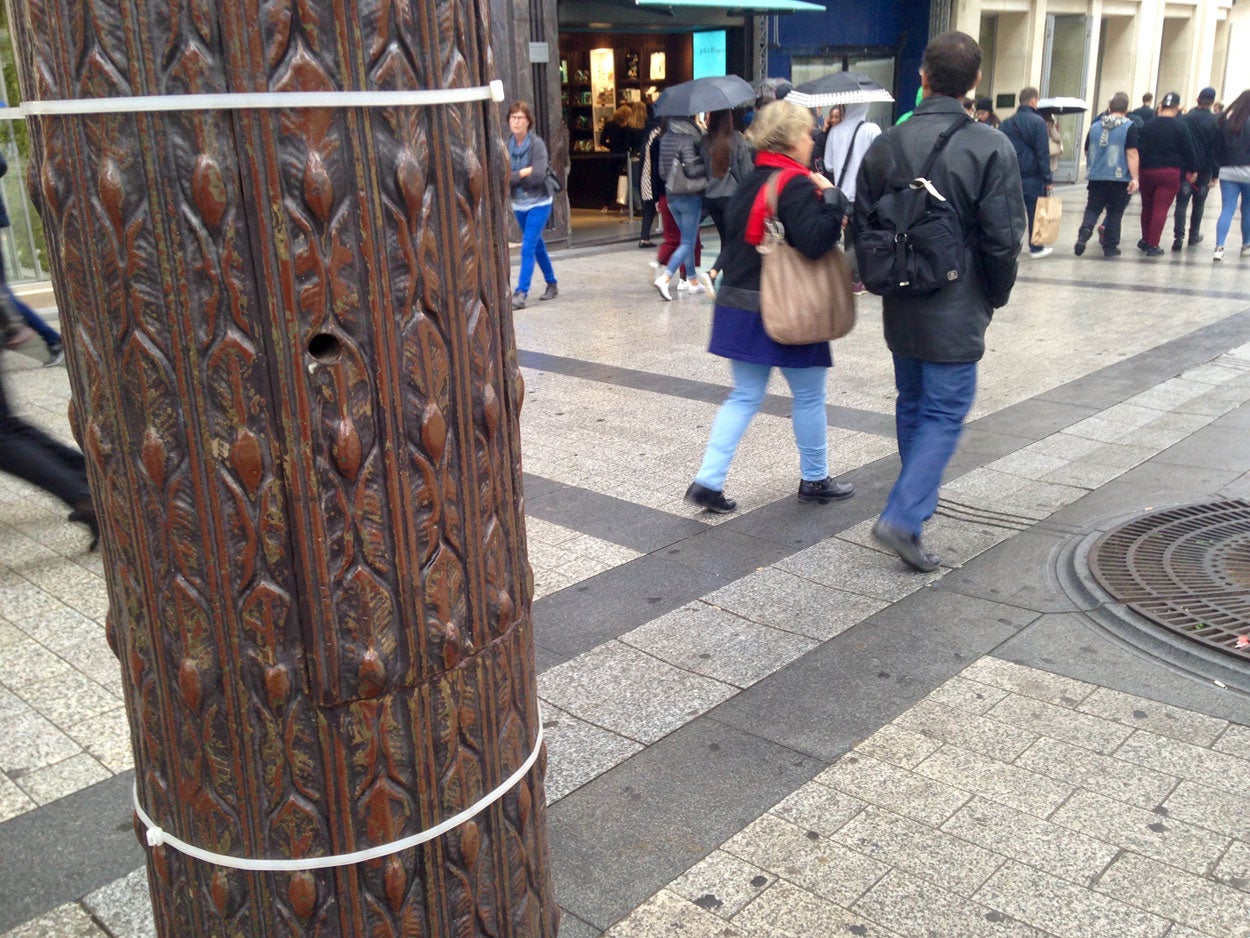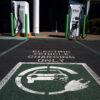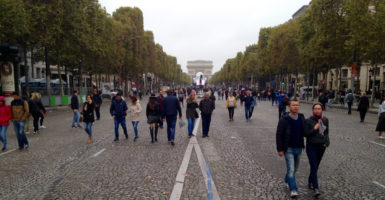PARIS—About a third of the way up Paris’s iconic Avenue des Champs Élysées, in front of a Marks & Spencer store, the trunk of a trimmed horse chestnut tree is ringed by two knotted ropes from which dried, wilted flowers hang.
The tree and the decaying tributes tied around it are easily overlooked, unless you know what happened here in April.
In the nearby lampposts bullet holes remained gouged into the painted green metal like someone had pushed a finger into a pile of play dough. Evidence of when an Islamist militant fatally gunned down 37-year-old French police officer Xavier Jugelé on April 20.
The Islamic State terror group claimed responsibility for the attack; police killed the gunman as he tried to flee.
On Sunday, as this correspondent snapped photos of the decaying flowers and the bullet holes, a curious man who stood nearby while smoking a cigarette asked what it was all about.
At the explanation that this was the scene of a fatal terrorist attack, and at the pointing out of the bullet holes—which were all but invisible to the flocks of pedestrians flowing past—the man, a Pakistani tourist named Fahad Ansari, replied in English, “Wow. That is so sad. I had no idea this was the spot.”
He spat on the ground.
“Daesh can go to hell,” Ansari said, using a pejorative Arabic name for the Islamic State terrorist group.
Reality Check
The Islamist terrorism threat has become a grim, permanent fixture in French life.
On Sunday, there was yet another deadly terrorist attack on French soil. Wielding a knife, a Tunisian man killed two 20-year-old women, who were cousins, outside the main train station in Marseille, a French port city on the Mediterranean.
The assailant, 29-year-old Ahmed Hanachi, reportedly shouted “Allahu akbar”—Arabic for “God is great”—before he murdered the two young cousins. The Islamic State, also known as ISIS, claimed responsibility for the attack. French officials said they were treating the attack as an act of terrorism, and French President Emmanuel Macron called the attack a “barbarous act.”
“The terrorist threat in Europe is stark and, sadly, is now an everyday reality across the Continent,” Robin Simcox, The Heritage Foundation’s Margaret Thatcher fellow, told The Daily Signal.
“France is suffering most,” Simcox said. “It has suffered more attacks than any other country in Europe.”
Since January 2015, Islamist terrorism attacks have killed 241 people in France. And since January of this year, French security officials have foiled 12 separate terrorist plots.
“We are still in a state of war,” French Interior Minister Gerard Collomb said in an interview on France Inter radio on Tuesday. “We have foiled numerous attacks since the start of the year that would have led to many deaths.”
France’s security apparatus has been on high alert since France’s former president, François Hollande declared a national state of emergency after the November 2015 Paris terror attacks, which killed 130.
Life in France has changed under the state of emergency, in both overt and subtle ways. You used to be able to walk right into landmarks like the Notre-Dame Cathedral, Sacré-Cœur Basilica, or the Musée d’Orsay without waiting in line. Now, lines stretch for hundreds of yards, and last for hours, as tourists wait to go through security checks.
On Friday morning, workers delivering building supplies dropped a wooden pallet on the sidewalk near Les Deux Magots café in the Saint-Germain-des-Prés area of Paris—a famous Ernest Hemingway haunt. There was a loud bang when the pallet hit the pavement. A good deal of nearby pedestrians ducked to the ground and anxiously looked around, reacting out of fearful instinct like one would to the sound of a mortar or sniper fire in a warzone.

The decaying memorial at the place where an Islamist militant murdered 37-year-old police officer Xavier Jugelé on April 20. (Photos: Nolan Peterson/The Daily Signal)
“My main assessment is that the French are certainly not accustomed to terrorism; they cannot and should not be,” Nicolas Tenzer, founder and president of the Centre for Study and Research for Political Decision, a Paris-based think tank, told The Daily Signal.
However, Tenzer added about the terrorism threat, the French people “will have to live with it during the next coming years or decades.”
The most glaring reminders of the terror threat are the ubiquitous squads of French army soldiers decked out in body armor and with loaded assault rifles at the ready patrolling in front of places like Notre-Dame Cathedral, through Charles de Gaulle Airport’s terminals, or under the Eiffel Tower.
Squads of armed soldiers also wandered through the gardens of Versailles last week. The troops spread out in a V-formation, weapons slung, heads pivoting in a constant scan as they made their way through the lavish gardens and fountains while classical music piped through concealed speakers.
Since the January 2015 Île-de-France terrorist attacks, which killed 17, French soldiers have been conducting patrols such as these as part of Operation Sentinelle—the country’s first domestic, peacetime deployment of combat troops.
About 7,000 French troops are still currently deployed to defend potential terrorist targets like major tourist and religious sites, and transportation hubs. The operation was later incorporated into the November 2015 state of emergency.
“Terrorist attacks have become regular events and the state of emergency—especially the presence of armed soldiers in the streets—seemed to reassure the French citizens,” Marcel Van Herpen, director of the Cicero Foundation, a Dutch think tank that specializes in European affairs, told The Daily Signal.
Leviathan
For France, the pall of terrorism extends further than stepped up security measures and the symptoms of habitual anxiety among its citizens. France is now on track to enshrine into law many of the extraordinary counterterrorism measures put into place as part of 2015’s national state of emergency.
Under the state of emergency, law enforcement personnel have been authorized to conduct warrantless arrests, raids, and surveillance operations. They also have had the power to shut down mosques suspected of spreading extremist ideologies.
Echoing a pledge from his campaign platform, on July 3 Macron, the French president, called for the lifting of the national state of emergency.
Macron said the emergency measures—which have been renewed five times since November 2015—run counter to France’s overall democratic principles. Macron has called for the emergency status to be rescinded at the beginning of November and for it to be replaced by a new anti-terrorism law.
On Tuesday, the French National Assembly passed the new anti-terrorism law by a margin of 415 votes in favor to 127 votes against, with 19 abstentions. The French Senate approved a variation of the measure in July. Lawmakers are expected to craft a joint text by the middle of October. By Nov. 1 the new legislation is set to replace the national state of emergency.
The emergency measures were always supposed to be temporary. Yet, Macron’s push to lift the national state of emergency and replace it with legislation is not a signal that he perceives the terrorist threat has abated. In fact, Macron’s anti-terrorism bill enshrines into law many of the most controversial measures from the national state of emergency—including, among others, warrantless raids and surveillance operations.
“[Macron’s] rhetoric on the campaign trail may have seemed like a good idea at the time,” Simcox said. “It is less appealing now he actually has to govern. There may be a time that France can roll back certain counterterrorism measures. But with almost 250 people killed since January 2015 alone, do not expect it to be anytime soon.”
Macron’s proposal underscores how French officials are girding for a practically everlasting terrorist threat, and are consequently unwilling to lower France’s defensive posture lest an attack occur on their watch.
“The main constraint for any government, beyond efficiency, is not to be perceived as being responsible for a preventable terrorist attack,” Tenzer said. “It has to show that it’s doing its best and cannot be seen as feeble or laxist.”
No Easy Answers
Advocates of the new anti-terrorism bill say France is at war and will be for a long time—so the nation’s laws must adapt to this new reality. According to polling, the majority of French people support such a line of thinking.
A poll published by Le Figaro, a French newspaper, reported that 57 percent of respondents supported the new anti-terrorism legislation.
“I would argue that French society has shown a remarkable tolerance considering the traumas of recent years,” Simcox, The Heritage Foundation fellow, said.
“Understandably, however, they want more to be done to improve security,” Simcox added. “So it is no surprise that a poll in Le Figaro last week showed 57 percent of people in support of this new bill.”

A bullet hole in a metal lamp post—lingering evidence of an April terrorist attack on the Avenue des Champs Élysées.
Other experts say that for the average French citizen most of the controversial counterterrorism measures in the new bill are transparent.
“I think in France the public is rather indifferent as concerns the details of the new law,” Van Herpen said. “It is rather the media, the [nongovernmental organizations], and the political class which are aware of the fact that one cannot make the state of emergency permanent.”
Yet, the proposed legislation has also come under fire from some quarters amid claims that it’s discriminatory toward French Muslims and contrary to bedrock French democratic values.
“Instead of truly ending France’s 19-month temporary state of emergency, the government is making some of its far-reaching powers permanent but with little effective court oversight,” said Kartik Raj, Western Europe researcher at Human Rights Watch, according to the nonprofit’s website.
“The problem with the new law is that it makes some regulations of the state of emergency permanent,” Van Herpen said. “There is also the fact that the Muslim population can consider itself to be the target of the new law.”
Sentinels
On Sunday, Parisian officials banned all motor traffic in the city center as part of a “car-free” day. City officials hailed the event as a chance to reduce pollution and vehicular noise.
As part of the car-free day, the Avenue des Champs Élysées was sealed off to traffic. Metal barricades blocked both ends of the street where police officers searched the bags of pedestrians. Street performers played for the throngs of passers-by who strolled along the cobblestone way, which, when not used for motor traffic, is typically reserved for military parades, the Tour de France peloton, or conquering armies.
Armed Operation Sentinelle patrols weaved through the crowds. On this gray, rainy day in Paris, there was no violence. The soldiers’ presence was nothing more than a reassuring symbol of security to the gathered crowds.
Meanwhile, 480 miles south of Paris, French soldiers patrolling the Marseille train station as part of the Sentinelle operation shot dead Hanachi, the knife-wielding assailant, after he had murdered two young women.
“I hail the Operation Sentinelle soldiers and the police forces who reacted with extreme calmness and efficiency,” Macron said in response to the Marseille attack.
Operation Sentinelle has taken some flak in the French press for its utility. But many French officials pointed to Sunday’s attack in Marseille as evidence that the extraordinary domestic deployment of French troops is still necessary despite the strain on military resources and manpower. According to news reports, Operation Sentinelle will not end when the new anti-terrorism law goes into effect, as it looks like it will, on Nov. 1.
“The government announces that the measures are not permanent, but are temporary,” Van Herpen said, referring to France’s new anti-terrorism legislation. “But,” he added, “as Goethe said: ‘It is what is temporary which, in the end, becomes permanent.’”






























